高中英语反义疑问句(详细)
高中英语反义疑问句(详细)
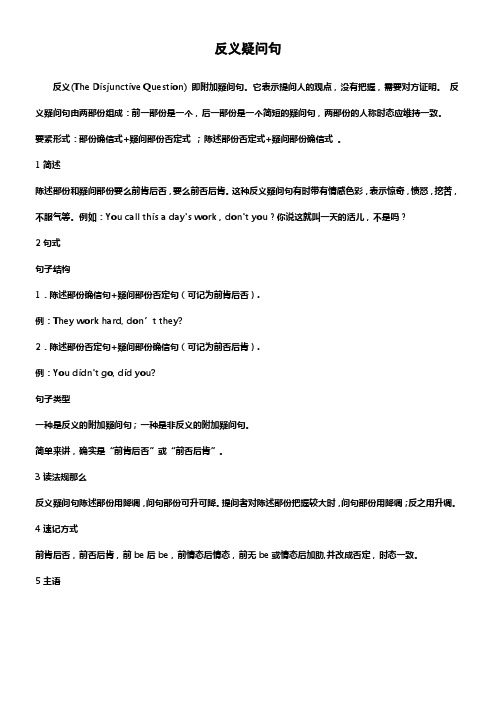
反义疑问句反义(The Disjunctive Question) 即附加疑问句。
它表示提问人的观点,没有把握,需要对方证明。
反义疑问句由两部份组成:前一部份是一个,后一部份是一个简短的疑问句,两部份的人称时态应维持一致。
要紧形式:部份确信式+疑问部份否定式;陈述部份否定式+疑问部份确信式。
1简述陈述部份和疑问部份要么前肯后否,要么前否后肯。
这种反义疑问句有时带有情感色彩,表示惊奇,愤怒,挖苦,不服气等。
例如:You call this a day's work,don't you?你说这就叫一天的活儿,不是吗?2句式句子结构1.陈述部份确信句+疑问部份否定句(可记为前肯后否).例:They work hard, don’t they?2.陈述部份否定句+疑问部份确信句(可记为前否后肯).例:You didn't go, did you?句子类型一种是反义的附加疑问句;一种是非反义的附加疑问句。
简单来讲,确实是“前肯后否”或“前否后肯”。
3读法规那么反义疑问句陈述部份用降调,问句部份可升可降。
提问者对陈述部份把握较大时,问句部份用降调;反之用升调。
4速记方式前肯后否,前否后肯,前be后be,前情态后情态,前无be或情态后加助,并改成否定,时态一致。
5主语一样词语附加疑问句中用和主句一致的主语,用。
附加疑问句侍从句。
不定代词当陈述部份的主语是(1)one时,后面的可用one/he.(2)no one时,后面附加疑问句中主语用they。
(3)everything,anything,nothing,something时,附加疑问句中主语用it 不用they(4)this, that,或those, these时,附加疑问句中主语用it或they.(5)everyone,everybody,someone,somebody,anyone,nobody等时,附加疑问句中主语一样用they(口头语,非正式文体)/he(正式文体)。
反义疑问句(最全)
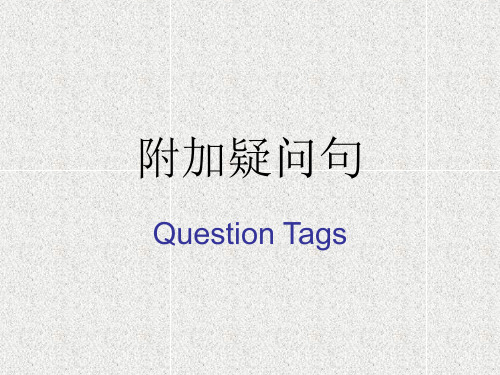
5.陈述部分有would rather +v.,疑问部分多用 wouldn’t +主语。 He would rather read it ten times than recite it, wouldn’t he? 6.陈述部分有you’d like to +v. 疑问部分用wouldn’t + 主语。 You’d like to go with me, wouldn’t you? 7.陈述部分是“there be”结构时,疑问部分用there省 略主语代词。 There is something wrong with your watch, isn't there? There will not be any trouble, will there? Note: 当为“ there used to be…”句型时,反意问句用 didn’t there。
b. 带有定语从句,宾语从句的主从复合句,疑问部分谓 语根据主句的谓语而定 He is not the man who gave us a talk, is he? He said he wanted to visit Japan, didn’t he?
c. 上述部分主句是由谓语think, believe, expect, suppose, imagine等引导的宾语从句,疑问部分与宾语 从句相对应构成反意疑问句 I don't think he is bright, is he? We believe she can do it better, can't she? Note: 但此时主语必须是第一人称。如果不是,则不能否定从 句。 He thought she was wrong, didn't he? 而不能说wasn't she?
(完整)高中英语反义疑问句(详细)

反义疑问句反义疑问句(The Disjunctive Question) 即附加疑问句。
它表示提问人的看法,没有把握,需要对方证实。
反义疑问句由两部分组成:前一部分是一个陈述句,后一部分是一个简短的疑问句,两部分的人称时态应保持一致。
主要形式:陈述部分肯定式+疑问部分否定式;陈述部分否定式+疑问部分肯定式。
1简述陈述部分和疑问部分要么前肯后否,要么前否后肯。
这类反义疑问句有时带有感情色彩,表示惊奇,愤怒,讽刺,不服气等。
例如:You call this a day's work,don't you?你说这就叫一天的活儿,不是吗?2句式句子结构1.陈述部分肯定句+疑问部分否定句(可记为前肯后否).例:They work hard, don’t they?2.陈述部分否定句+疑问部分肯定句(可记为前否后肯).例:You didn't go, did you?句子类型一种是反义的附加疑问句;一种是非反义的附加疑问句。
简单来说,就是“前肯后否”或“前否后肯”。
3读法规则反义疑问句陈述部分用降调,问句部分可升可降。
提问者对陈述部分把握较大时,问句部分用降调;反之用升调。
4速记方法前肯后否,前否后肯,前be后be,前情态后情态,前无be或情态后加助,并改为否定,时态一致。
5主语一般词语附加疑问句中主语用和主句一致的主语,用主格。
附加疑问句随从句。
不定代词当陈述部分的主语是(1)one时,后面的疑问句可用one/he.(2)no one时,后面附加疑问句中主语用they。
(3)everything,anything,nothing,something时,附加疑问句中主语用it 不用they(4)this, that,或those, these时,附加疑问句中主语用it或they.(5)everyone,everybody,someone,somebody,anyone,nobody等时,附加疑问句中主语一般用they (口头语,非正式文体)/he(正式文体)。
(完整word版)高中反义疑问句
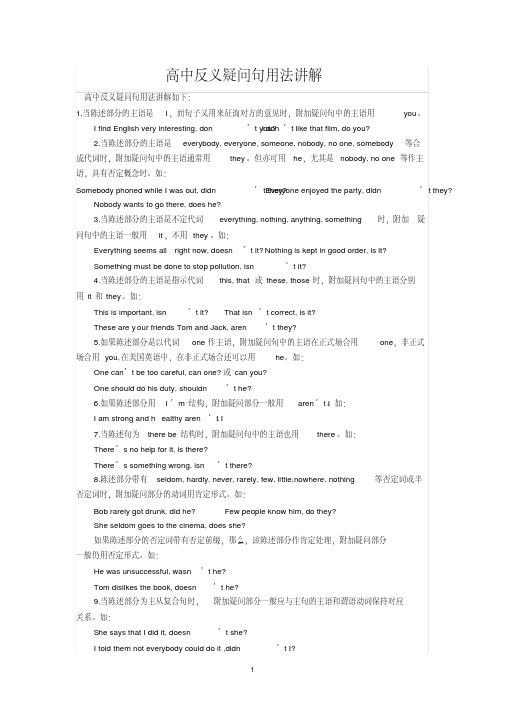
高中反义疑问句用法讲解高中反义疑问句用法讲解如下:1.当陈述部分的主语是I,而句子又用来征询对方的意见时,附加疑问句中的主语用you。
I don’t like that film, do you?I find English very interesting, don’t you?2.当陈述部分的主语是everybody, everyone, someone, nobody, no one, somebody等合成代词时,附加疑问句中的主语通常用they。
但亦可用he,尤其是nobody, no one等作主语,具有否定概念时。
如:Everyone enjoyed the party, didn’t they? Somebody phoned while I was out, didn’t they?Nobody wants to go there, does he?3.当陈述部分的主语是不定代词everything, nothing, anything, something时,附加疑问句中的主语一般用it,不用they。
如:Everything seems all right now, doesn’t it?Nothing is kept in good order, is it?Something must be done to stop pollution, isn’t it?4.当陈述部分的主语是指示代词this, that或these, those时,附加疑问句中的主语分别用it和they。
如:This is important, isn’t it?That isn’t correct, is it?These are y our friends Tom and Jack, aren’t they?5.如果陈述部分是以代词one作主语,附加疑问句中的主语在正式场合用one,非正式场合用you,在美国英语中,在非正式场合还可以用he。
高考英语重点语法复习反义疑问句

高考英语重点语法复习反义疑问句Standardization of sany group #QS8QHH-HHGX8Q8-GNHHJ8-HHMHGN#反义疑问句反义疑问句(The Disjunctive Question)又叫附加疑问句(Tag Question)。
在口语中,反义疑问句用于发起谈话、询问信息或是礼貌的请求别人去做某件事。
反义疑问句由两部分组成:前一部分是一个陈述句,后一部分是一个简短的疑问句,两部分的人称时态应保持一致。
总体规则一、反义疑问句的语调1、在说话人知道问题的答案,使用反义疑问句表示请求赞同时,后面的反义疑问句部分用降调。
That film was fantastic, wasn't it ↘2、在说话人不明确问题的答案,使用反义疑问句表示说话人需要核实信息时,后面的反义疑问句部分用升调。
You don't know where the boss is, do you ↗二、反意疑问句中的对应规则:1、反意疑问句中问句部分的谓语动词与陈述部分的谓语动词在语气上成相反的对应关系,即:肯定+否定否定+肯定?①You can’t do it, can you?②They are very late for the meeting, aren’t they?2、反意疑问句中问句部分的动词与陈述部分的动词种类要对应一致。
如:①He has supper at home every day, doesn’t he (不能用hasn’t he)②They have known the matter, haven’t they (不能用don’t they)3、反意疑问句中问句部分的动词在时态上应和陈述部分的时态一致。
如:①They will go to town soon, won’t they (不能用don’t they或aren’t they)②He works very hard, doesn’t he (不能用didn’t he或won’t he)注:当陈述部分是I think 加从句时,疑问句应和从句的人称时态保持一致。
高考英语 几种特殊的反义疑问句总结

高考英语几种特殊的反义疑问句总结1.祈使句。
祈使句后一般加上will you或won't you构成反意疑问句,用will you 多表示“请求”,用won't you 多表示提醒对方注意。
例如:Look at the blackboard, will you/ won't you?Let引导的祈使句有两种情况:1) Let's...,后的反意疑问句用shall we或shan't we。
例如:Let's go home, shall we/ shan't we?还可以用may I来表示征求对方的同意或许可。
2)Let us/me...后的反意疑问句用will you或won't you。
例如:Let me have a try, will you/won't you?2.感叹句。
感叹句后加反意疑问句时,其反意疑问句需用be的一般现在时态的否定形式。
例如:What fine weather, isn't it?3. 当陈述部分谓语动词是need, dare, 且这些词被用作实义动词时,其反意疑问句需用do的适当形式。
例如:He needs help, doesn't he?4.陈述部分主、谓语是I am...时,反意疑问句用aren't I 或ain't I ,而不是am notI (可用am I not)。
例如:I'm working now, ain't I?5.陈述部分的主语是everything, nothing, anything或something 时,反意疑问句的主语应用代词it。
例如:Something is wrong with my radio, isn't it?6.陈述部分的主语是everybody, everyone, anybody, anyone, somebody, someone, nobody, no one, none, neither 时, 其反意疑问句的主语需用复数代词they。
高中英语反义疑问句
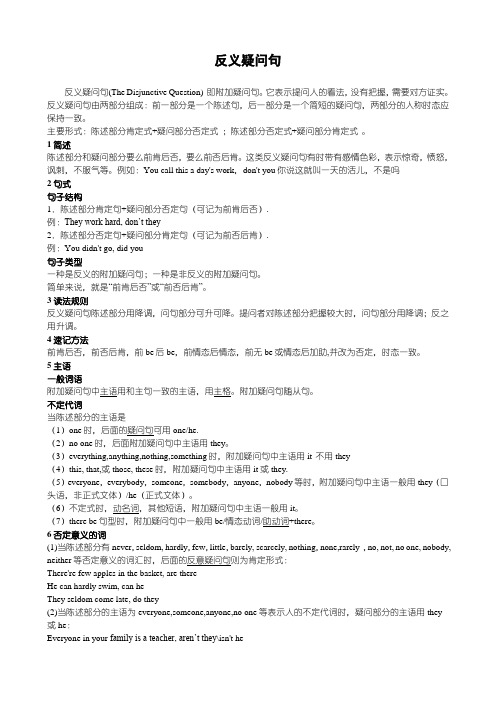
反义疑问句反义疑问句(The Disjunctive Question) 即附加疑问句。
它表示提问人的看法,没有把握,需要对方证实。
反义疑问句由两部分组成:前一部分是一个陈述句,后一部分是一个简短的疑问句,两部分的人称时态应保持一致。
主要形式:陈述部分肯定式+疑问部分否定式;陈述部分否定式+疑问部分肯定式。
1简述陈述部分和疑问部分要么前肯后否,要么前否后肯。
这类反义疑问句有时带有感情色彩,表示惊奇,愤怒,讽刺,不服气等。
例如:You call this a day's work,don't you你说这就叫一天的活儿,不是吗2句式句子结构1.陈述部分肯定句+疑问部分否定句(可记为前肯后否).例:They work hard, don’t they2.陈述部分否定句+疑问部分肯定句(可记为前否后肯).例:You didn't go, did you句子类型一种是反义的附加疑问句;一种是非反义的附加疑问句。
简单来说,就是“前肯后否”或“前否后肯”。
3读法规则反义疑问句陈述部分用降调,问句部分可升可降。
提问者对陈述部分把握较大时,问句部分用降调;反之用升调。
4速记方法前肯后否,前否后肯,前be后be,前情态后情态,前无be或情态后加助,并改为否定,时态一致。
5主语一般词语附加疑问句中主语用和主句一致的主语,用主格。
附加疑问句随从句。
不定代词当陈述部分的主语是(1)one时,后面的疑问句可用one/he.(2)no one时,后面附加疑问句中主语用they。
(3)everything,anything,nothing,something时,附加疑问句中主语用it 不用they(4)this, that,或those, these时,附加疑问句中主语用it或they.(5)everyone,everybody,someone,somebody,anyone,nobody等时,附加疑问句中主语一般用they(口头语,非正式文体)/he(正式文体)。
(完整版)反义疑问句详细讲解及习题及答案
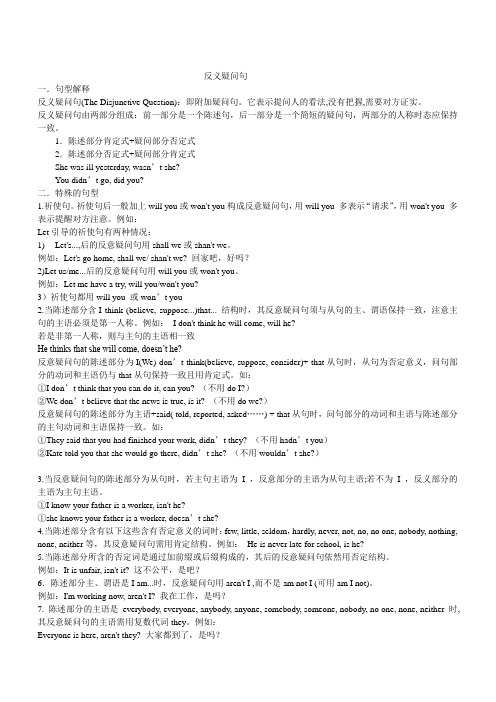
反义疑问句一.句型解释反义疑问句(The Disjunctive Question):即附加疑问句。
它表示提问人的看法,没有把握,需要对方证实。
反义疑问句由两部分组成:前一部分是一个陈述句,后一部分是一个简短的疑问句,两部分的人称时态应保持一致。
1.陈述部分肯定式+疑问部分否定式2.陈述部分否定式+疑问部分肯定式She was ill yesterday, wasn’t she?You didn’t go, did you?二.特殊的句型1.祈使句。
祈使句后一般加上will you或won't you构成反意疑问句,用will you 多表示“请求”,用won't you 多表示提醒对方注意。
例如:Let引导的祈使句有两种情况:1) Let's...,后的反意疑问句用shall we或shan't we。
例如:Let's go home, shall we/ shan't we? 回家吧,好吗?2)Let us/me...后的反意疑问句用will you或won't you。
例如:Let me have a try, will you/won't you?3)祈使句都用will you 或won’t you2.当陈述部分含I think (believe, suppose...)that... 结构时,其反意疑问句须与从句的主、谓语保持一致,注意主句的主语必须是第一人称。
例如:I don't think he will come, will he?若是非第一人称,则与主句的主语相一致He thinks that she will come, doesn’t he?反意疑问句的陈述部分为I(We) don’t think(believe, suppose, consider)+ that从句时,从句为否定意义,问句部分的动词和主语仍与that从句保持一致且用肯定式。
(完整版)高考英语反意疑问句讲解及练习
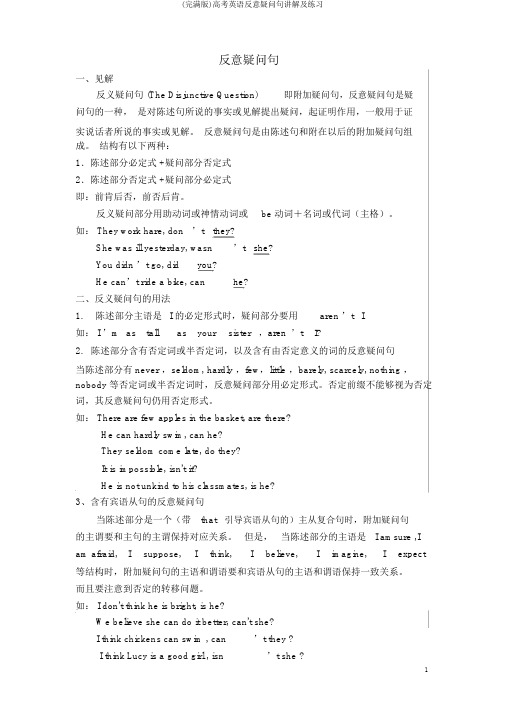
反意疑问句一、见解反义疑问句 (The Disjunctive Question)即附加疑问句,反意疑问句是疑问句的一种,是对陈述句所说的事实或见解提出疑问,起证明作用,一般用于证实说话者所说的事实或见解。
反意疑问句是由陈述句和附在以后的附加疑问句组成。
结构有以下两种:1.陈述部分必定式 +疑问部分否定式2.陈述部分否定式 +疑问部分必定式即:前肯后否,前否后肯。
反义疑问部分用助动词或神情动词或be 动词+名词或代词(主格)。
如: They work hare, don’t they?She was ill yesterday, wasn’t she?You didn ’t go, did you?He can’t ride a bike, can he?二、反义疑问句的用法1. 陈述部分主语是I 的必定形式时,疑问部分要用aren ’t I.如: I ’m as tall as your sister,aren’t I?2.陈述部分含有否定词或半否定词,以及含有由否定意义的词的反意疑问句当陈述部分有 never ,seldom, hardly ,few,little ,barely, scarcely, nothing ,nobody 等否定词或半否定词时,反意疑问部分用必定形式。
否定前缀不能够视为否定词,其反意疑问句仍用否定形式。
如: There are few apples in the basket, are there?He can hardly swim, can he?They seldom come late, do they?It is impossible, isn't it?He is not unkind to his classmates, is he?3、含有宾语从句的反意疑问句当陈述部分是一个(带that引导宾语从句的)主从复合句时,附加疑问句的主谓要和主句的主谓保持对应关系。
反义疑问句超详细讲解!!!
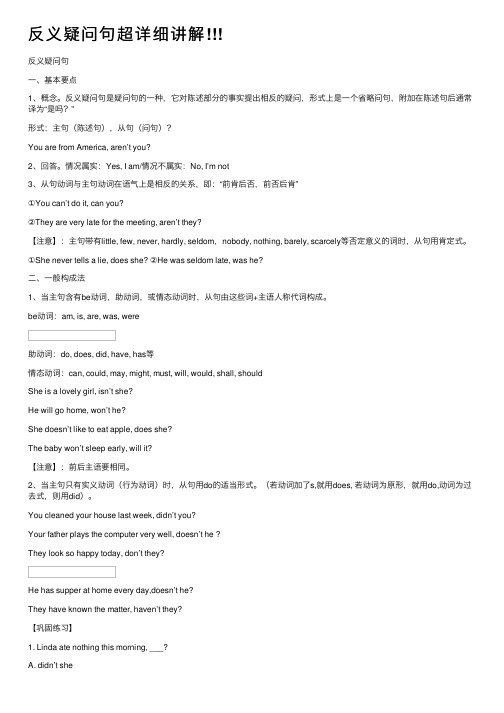
反义疑问句超详细讲解反义疑问句⼀、基本要点1、概念。
反义疑问句是疑问句的⼀种,它对陈述部分的事实提出相反的疑问,形式上是⼀个省略问句,附加在陈述句后通常译为“是吗?”形式:主句(陈述句),从句(问句)?You are from America, aren’t you?2、回答。
情况属实:Yes, I am/情况不属实:No, I’m not3、从句动词与主句动词在语⽓上是相反的关系,即:“前肯后否,前否后肯”①You can’t do it, can you?②They are very late for the meeting, aren’t they?【注意】:主句带有little, few, never, hardly, seldom,nobody, nothing, barely, scarcely等否定意义的词时,从句⽤肯定式。
①She never tells a lie, does she? ②He was seldom late, was he?⼆、⼀般构成法1、当主句含有be动词,助动词,或情态动词时,从句由这些词+主语⼈称代词构成。
be动词:am, is, are, was, were助动词:do, does, did, have, has等情态动词:can, could, may, might, must, will, would, shall, shouldShe is a lovely girl, isn’t she?He will go home, won’t he?She doesn’t like to eat apple, does she?The baby won’t sleep early, will it?【注意】:前后主语要相同。
2、当主句只有实义动词(⾏为动词)时,从句⽤do的适当形式。
(若动词加了s,就⽤does, 若动词为原形,就⽤do,动词为过去式,则⽤did)。
高考英语反义疑问句

请注意以下句型的反义疑 问句的用法:
1)陈述部分的主语是I,疑问部 分要用 aren't I.
I‘m as tall as your sister, aren't I?
I am a student, aren’t I
2)陈述部分的谓语是wish,疑 问部分要用may +主语
I wish to have a word with you, may I?
18)陈述部分是"there be"结构 的,疑问部分用there省略主语 代词。
There is something wrong with your watch, isn't there? There will not be any trouble, will there? There were many people in the room then, weren’t there?
Let's go and listen to the music, shall we? Let us wait for you in the reading-room, will you ?
It is a fine day. Let’s go fishing, _sh_a_l_l_w_e_? Let us do this job,_w_i_ll_y_o_u_? Turn on the radio,_w_i_ll_y_o_u_?
b.带有定语从句,宾语从句 的主从复合句,疑问部分谓 语根据主句的谓语而定:
He is not the man who gave us a talk, is he? He said he wanted to visit Japan, didn't he?
反义疑问句(含解析、例句及详尽用法)
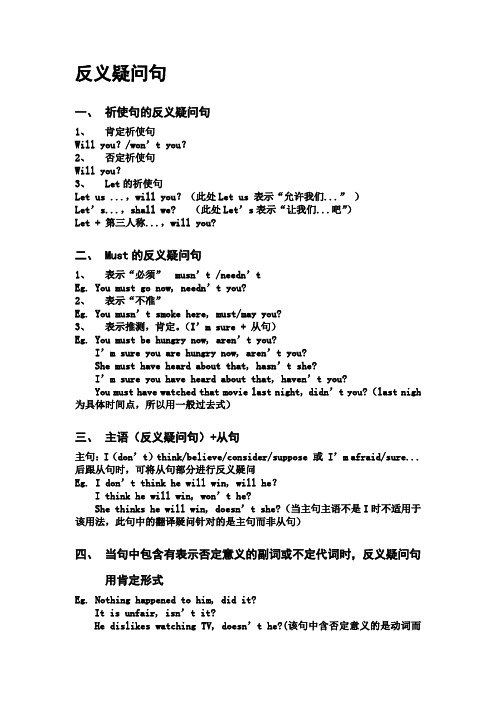
反义疑问句一、祈使句的反义疑问句1、肯定祈使句Will you?/won’t you?2、否定祈使句Will you?3、Let的祈使句Let us ...,will you?(此处Let us 表示“允许我们...”)Let’s...,shall we? (此处Let’s表示“让我们...吧”)Let + 第三人称...,will you?二、Must的反义疑问句1、表示“必须” musn’t /needn’tEg. You must go now, needn’t you?2、表示“不准”Eg. You musn’t smoke here, must/may you?3、表示推测,肯定。
(I’m sure + 从句)Eg. You must be hungry now, aren’t you?I’m sure you are hungry now, aren’t you?She must have heard about that, hasn’t she?I’m sure you have heard about that, haven’t you?You must have watched that movie last night, didn’t you?(last nigh 为具体时间点,所以用一般过去式)三、主语(反义疑问句)+从句主句:I(don’t)think/believe/consider/suppose 或 I’m afraid/sure...后跟从句时,可将从句部分进行反义疑问Eg. I don’t think he will win, will he?I think he will win, won’t he?She thinks he will win, doesn’t she?(当主句主语不是I时不适用于该用法,此句中的翻译疑问针对的是主句而非从句)四、当句中包含有表示否定意义的副词或不定代词时,反义疑问句用肯定形式Eg. Nothing happened to him, did it?It is unfair, isn’t it?He dislikes watching TV, doesn’t he?(该句中含否定意义的是动词而非副词或不定代词,因此不适用于该用法,反义疑问句仍然使用否定形式)五、反义疑问句的回答反义疑问句的回答针对被提问部分的谓语动词,且与回答句前部分的Yes和No 保持一致Eg. A: You haven’t lost the ticket, have you?B: D I know it’s hard to get another one at this moment.A. Yes, I haven’tB. No, I haveC. I hope soD. I’m afraid not六、陈述部分的主语与反义疑问句主语保持一致的情况1、OneEg. One can’t be too careful when driving a car, can one/he?一个人在开车的时候再怎么小心也不为过。
高中英语反义疑问句(详细)(2021年整理)
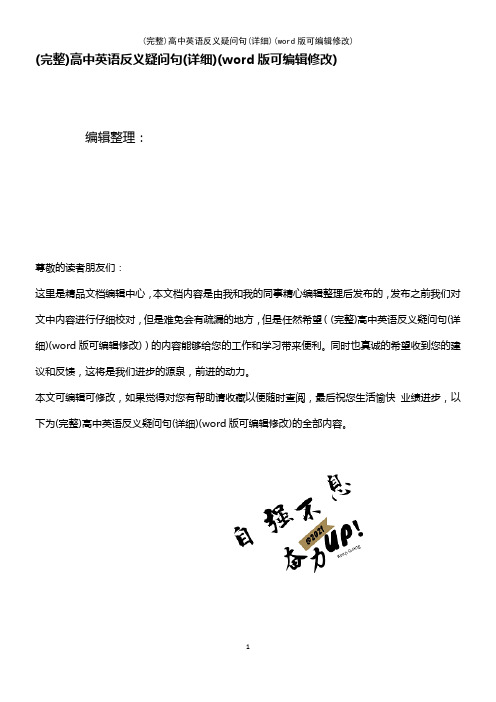
(完整)高中英语反义疑问句(详细)(word版可编辑修改)编辑整理:尊敬的读者朋友们:这里是精品文档编辑中心,本文档内容是由我和我的同事精心编辑整理后发布的,发布之前我们对文中内容进行仔细校对,但是难免会有疏漏的地方,但是任然希望((完整)高中英语反义疑问句(详细)(word版可编辑修改))的内容能够给您的工作和学习带来便利。
同时也真诚的希望收到您的建议和反馈,这将是我们进步的源泉,前进的动力。
本文可编辑可修改,如果觉得对您有帮助请收藏以便随时查阅,最后祝您生活愉快业绩进步,以下为(完整)高中英语反义疑问句(详细)(word版可编辑修改)的全部内容。
反义疑问句反义疑问句(The Disjunctive Question)即附加疑问句.它表示提问人的看法,没有把握,需要对方证实. 反义疑问句由两部分组成:前一部分是一个陈述句,后一部分是一个简短的疑问句,两部分的人称时态应保持一致。
主要形式:陈述部分肯定式+疑问部分否定式;陈述部分否定式+疑问部分肯定式。
1简述陈述部分和疑问部分要么前肯后否,要么前否后肯。
这类反义疑问句有时带有感情色彩,表示惊奇,愤怒,讽刺,不服气等.例如:You call this a day’s work,don't you?你说这就叫一天的活儿,不是吗?2句式句子结构1.陈述部分肯定句+疑问部分否定句(可记为前肯后否)。
例:They work hard, don’t they?2.陈述部分否定句+疑问部分肯定句(可记为前否后肯).例:You didn’t go, did you?句子类型一种是反义的附加疑问句;一种是非反义的附加疑问句。
简单来说,就是“前肯后否”或“前否后肯”。
3读法规则反义疑问句陈述部分用降调,问句部分可升可降.提问者对陈述部分把握较大时,问句部分用降调;反之用升调。
4速记方法前肯后否,前否后肯,前be后be,前情态后情态,前无be或情态后加助,并改为否定,时态一致。
高中英语语法讲解反义疑问句
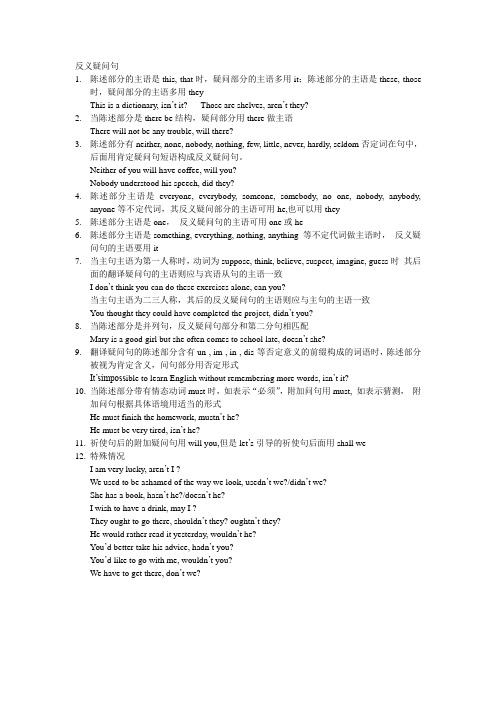
反义疑问句1.陈述部分的主语是this, that时,疑问部分的主语多用it;陈述部分的主语是these, those时,疑问部分的主语多用theyThis is a dictionary, isn’t it? Those are shelves, aren’t they?2.当陈述部分是there be结构,疑问部分用there做主语There will not be any trouble, will there?3.陈述部分有neither, none, nobody, nothing, few, little, never, hardly, seldom否定词在句中,后面用肯定疑问句短语构成反义疑问句。
Neither of you will have coffee, will you?Nobody understood his speech, did they?4.陈述部分主语是everyone, everybody, someone, somebody, no one, nobody, anybody,anyone等不定代词,其反义疑问部分的主语可用he,也可以用they5.陈述部分主语是one,反义疑问句的主语可用one或he6.陈述部分主语是something, everything, nothing, anything 等不定代词做主语时,反义疑问句的主语要用it7.当主句主语为第一人称时,动词为suppose, think, believe, suspect, imagine, guess时其后面的翻译疑问句的主语则应与宾语从句的主语一致I don’t think you can do these exercises alone, can you?当主句主语为二三人称,其后的反义疑问句的主语则应与主句的主语一致You thought they could have completed the project, didn’t you?8.当陈述部分是并列句,反义疑问句部分和第二分句相匹配Mary is a good girl but she often comes to school late, doesn’t she?9.翻译疑问句的陈述部分含有un-, im-, in-, dis-等否定意义的前缀构成的词语时,陈述部分被视为肯定含义,问句部分用否定形式It’simposs ible to learn English without remembering more words, isn’t it?10.当陈述部分带有情态动词must时,如表示“必须”,附加问句用must, 如表示猜测,附加问句根据具体语境用适当的形式He must finish the homework, mustn’t he?He must be very tired, isn’t he?11.祈使句后的附加疑问句用will you,但是let’s引导的祈使句后面用shall we12.特殊情况I am very lucky, aren’t I ?We used to be ashamed of the way we look, usedn’t we?/didn’t we?She has a book, hasn’t he?/doesn’t he?I wish to have a drink, may I ?They ought to go there, shouldn’t they? oughtn’t they?He would rather read it yesterday, wouldn’t he?You’d better take his advice, hadn’t you?You’d like to go with me, wouldn’t you?We have to get there, don’t we?语法填空之反意疑问句(学生版)完成下列句子1、Few of them hurt themselves in the accident last night,___________ ?2.--You’ve never seen dinosaur eggs, have you ?--_______________. How I wish to visit the Dinosaur World.3、His sister had a bad cough, _________she?4、Mr. Green went to Shenzhen on business last week,________?5. John can hardly understand any Chinese, _________he?6、Don’t smoke in th e meeting-room,_________?7、Lucy, you clean the blackboard today,_______ ?8. Miss Cheng will never forget her first visit to Canada ,________?9、The lady couldn’t say a word when she saw the snake,__________?10、__________the population of china? 1,300,000,000.11、---______I go and meet you at the airport?---No ,thanks, dear . I can take a taxi home.12、------________is the Confucian Temple(孔庙) from here?------It’s about 10 minutes’ walk.13、-----_________may I keep these books?-----two weeks.14、Tina is unhappy now,____________?15、---You won’t follow his example, will you ?---________________,I don’t think he is right.16、----__________do you go to Hong Kong?----sorry , I’ve never been there.17、---The boy has to stay at home to look after his little sister,_________?---Yes, because his mother has gone shopping.18、----You lent me some money a few months ago.-----_________? I don’t remember lending you any money .19、My uncle has never been to a foreign country,_____________?20、There is some water in that bottle, ___________?21、----_____________will the foreign students be back from NanJing?----In two days, I think .22、---Let’s go and play football,__________?---That’s wonderf ul.23. I don’t think that the necklace is made of diamond, __________?24. His wife had the carpets and the curtains cleaned, ____________?25.It’s my son’s wedding next week, and I have to do my best for that,__________?26.Harry wouldn’t become a teacher if it hadn’t been for the holiday, __________?27. No one left here yesterday,_____________?28. Birds rarely build nests in our garden,_____________?29. You must have been to the Great Wall,____________?30. Learning how to repair motors takes a long time, _____________?31.They must have stayed at home last night,____________?32.There’s not much news in today’s newspaper, _____________?33.They need our help badly at the moment, ______________?34.She is unfit for the position, _____________?35.I wish to visit America, _____________?36.She’s been a worker here for many years,______________?37.What beautiful flowers,______________?38.Mother used to live in a poor village,____________?39.You’d better go at once, _____________?40.I am very interested in Mark Twain’s novels,____________?41. He never gets up late , ?42. Don’t go out ,?43.Everything begins to grow in spring, ?44.He can hardly finish the work, ?45.Let us go home , ?46. You think he is a good student, ?47.Nobody knows where she lives, ?48.Few students can answer the question, ?49. You needn’t attend the meeting, ______________________?50. We need to come on Sunday, ________________?语法填空之反意疑问句(学生版)完成下列句子1、Few of them hurt themselves in the accident last night,___________ ?2.--You’ve never seen dinosaur eggs, have yo u ?--_______________. How I wish to visit the Dinosaur World.3、His sister had a bad cough, _________she?4、Mr. Green went to Shenzhen on business last week,________?5. John can hardly understand any Chinese, _________he?6、Don’t smoke in the meeting-room,_________?7、Lucy, you clean the blackboard today,_______ ?8. Miss Cheng will never forget her first visit to Canada ,________?9、The lady couldn’t say a word when she saw the snake,__________?10、__________the population of china? 1,300,000,000.11、---______I go and meet you at the airport?---No ,thanks, dear . I can take a taxi home.12、------________is the Confucian Temple(孔庙) from here?------It’s about 10 minutes’ walk.13、-----_________may I keep these books?-----two weeks.14、Tina is unhappy now,____________?15、---You won’t follow his example, will you ?---________________,I don’t think he is right.16、----__________do you go to Hong Kong?----sorry , I’ve never been there.17、---The boy has to stay at home to look after his little sister,_________?---Yes, because his mother has gone shopping.18、----You lent me some money a few months ago.-----_________? I don’t remember lending you any money .19、My uncle has never been to a foreign country,_____________?20、There is some water in that bottle, ___________?21、----_____________will the foreign students be back from NanJing?----In two days, I think .22、---Let’s go and play football,__________?---That’s wonderful.23. I don’t think that the necklace is made of diamond, __________?24. His wife had the carpets and the curtains cleaned, ____________?25.It’s my son’s wedding next week, and I have to do my best for that,__________?26.Harry wouldn’t become a teacher if it hadn’t been for the holiday, __________?27. No one left here yesterday,_____________?28. Birds rarely build nests in our garden,_____________?29. You must have been to the Great Wall,____________?30. Learning how to repair motors takes a long time, _____________?31.They must have stayed at home last night,____________?32.There’s not much news in today’s newspaper, _____________?33.They need our help badly at the moment, ______________?34.She is unfit for the position, _____________?35.I wish to visit America, _____________?36.She’s been a worker here for many years,______________?37.What beautiful flowers,______________?38.Mother used to live in a poor village,____________?39.You’d better go at once, _____________?40.I am very interest ed in Mark Twain’s novels,____________?41. He never gets up late , ?42. Don’t go out ,?43.Everything begins to grow in spring, ?44.He can hardly finish the work, ?45.Let us go home , ?46. You think he is a good student, ?47.Nobody knows where she lives, ?48.Few students can answer the question, ?49. You needn’t attend the meeting, ______________________?50. We need to come on Sunday, ________________?语法填空之反意疑问句(教师版)完成下列句子1、Few of them hurt themselves in the accident last night,___________ ? did they2.--You’ve never seen dinosaur eggs, have you ?No, I haven’t--_______________. How I wish to visit the Dinosaur World.3、His sister had a bad cough, _________she?didn’t4、Mr. Green went to Shenzhen on business last week,________?didn’t he5. John can hardly understand any Chinese, _________he? can6、Don’t smo ke in the meeting-room,_________? will you7、Lucy, you clean the blackboard today,_______ ?will you8. Miss Cheng will never forget her first visit to Canada ,________? will she9、The lady couldn’t say a word when she saw the snake,__________? could she10、__________the population of china? 1,300,000,000. What’s11、---______I go and meet you at the airport? Shall---No ,thanks, dear . I can take a taxi home.12、------________is the Confucian Temple(孔庙) from here? How far------It’s about 10 minutes’ walk.13、-----_________may I keep these books? How long-----two weeks.14、Tina is unhappy now,____________?isn’t she15、---You won’t follow his example, will you ?---________________,I don’t think he is right.No, I won’t16、----__________do you go to Hong Kong? How often----sorry , I’ve never been there.17、---The boy has to stay at home to look after his little sister,_________? doesn’t he---Yes, because his mother has gone shopping.18、----You lent me some money a few months ago.-----_________? I don’t remember lending you any money . Did I19、My uncle has never been to a foreign country,_____________? has he20、There is some water in that bottle, ___________? isn’t there21、----_____________will the foreign students be back from NanJing?----In two days, I think . How soon22、---Let’s go and play football,__________? shall we---That’s wonderful.23. I don’t think that the necklace is made of diamond, __________? is it24. His wife had the carpets and the curtains cleaned, ____________? didn’t she25.It’s my son’s wedding next week, and I have to do my best for that,__________? don’t I26.Harry wouldn’t become a teacher if it hadn’t been for the holiday, __________? would he27. No one left here yesterday,_____________? did they28. Birds rarely build nests in our garden,_____________? do they29. You must have been to the Great Wall,____________? haven’t you30. Learning how to repair motors takes a long time, _____________? doesn’t it31.They must have stayed at home last night,____________? didn’t they32.There’s not much news in today’s newspaper, _____________? is there33.They need our help badly at the moment, ______________? don’t they34.She is unfit for the position, _____________? isn’t she35.I wish to visit America, _____________? may I36.She’s been a worker here for many years,______________? hasn’t she37.What beautiful flowers,______________? aren’t they38.Mother used to live in a poor village,____________? usedn’t she/didn’t she39.You’d better go at once, _____________? hadn’t you40.I am very interested in Mark Twain’s novels,____________? aren’t I41. He never gets up late , ?does he42. Don’t go out ,?will you43.Everything begins to grow in spring, ?doesn’t it44.He can hardly finish the work, ?can he45.Let us go home , ? will you46. You think he is a good student, ?don’t you47.Nobody knows where she lives, ? dothey/does he48.Few students can answer the question, ?can they49. You needn’t attend the meeting, ______________________? need you50. We need to come on Sunday, ________________? do n’t we。
高三英语反义疑问句

请注意以下句型的反义疑 问句的用法:
1)陈述部分的主语是I,疑问部 分要用 aren't I.
I‘m as tall as your sister, aren't I?
I am a student, aren’t I
2)陈述部分的谓语是wish,疑 问部分要用may +主语
19)否定前缀不能视为否定词, 其反意疑问句仍用否定形式。 It is impossible, isn't it?
He is not unkind to his classmates, is he?
6. 反义疑问句的回答用yes,no 但是,当陈述部分是否定形式时, 回答要按事实。 They don’t work hard, do they? Yes, they do.
18)陈述部分是"there be"结构 的,疑问部分用there省略主语 代词。
There is something wrong with your watch, isn't there? There will not be any trouble, will there? There were many peoቤተ መጻሕፍቲ ባይዱle in the room then, weren’t there?
I wish to have a word with you, may I?
17)省去主语的祈使句的反意疑 问句,疑问部分用will you。 Don't do that again, will you?
Go with me, will you / won't you ?
注意:Let's 开头的祈使句,后 用shall we? Let us 开头的祈使句,后 用will you?
高三英语反义疑问句
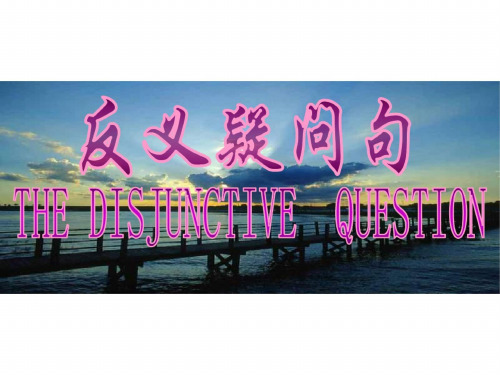
人对出生之地死了心,就会抬起头,向外求助。搬迁或留住,成了那些农人们的单项选择题,移民,就是这种求助眼光下产生的新身份。留住者的努力,搬迁者的艰辛,成了我对那片土地关注的两 根水管,不断往我的写作田畴中输送营养。
那丰沛的历史和贫困的现状、曾经的绝望死守与现在的努力改变,这一切构成巨大反差,像一群演员,走到了时代背景下凸显出的命运选择前,他们将身份观照下,就变成一种工作式的记录,被我那些散布在城乡的朋友们视为一种习惯时,它就成了我生命中的另一份卷宗。。 抗体 https:///
地是死的,庄稼是人能让地活的惟一方式,当这惟一的方式也死了时,人对地的那份心思也就死了。他们只能抬起头,无助地望着天空,然而,那些连雨也兜不住的云,像长不出粮食的土地一样, 像一个连医院都宣布濒死的危重病人回到自家院子里挪步一样,偶尔有一丝两丝的,以干瘪、有气无力的状貌悬在天空。天空,常常成为农人们诅咒的对象。
高中英语 语法讲解 反义疑问句
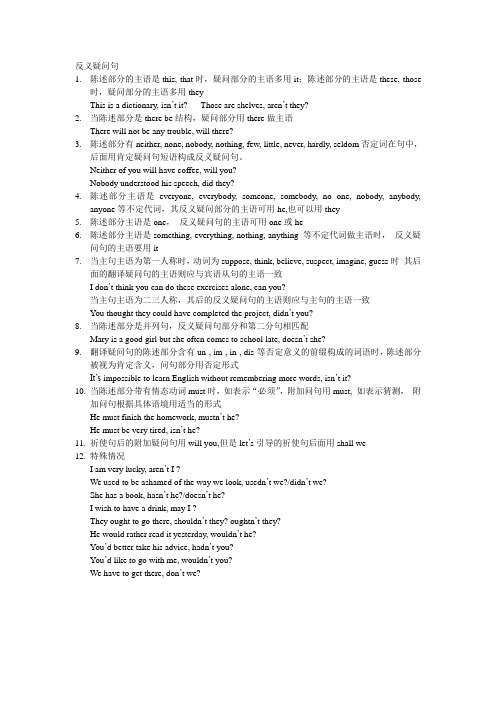
反义疑问句1.陈述部分的主语是this, that时,疑问部分的主语多用it;陈述部分的主语是these, those时,疑问部分的主语多用theyThis is a dictionary, isn’t it? Those are shelves, aren’t they?2.当陈述部分是there be结构,疑问部分用there做主语There will not be any trouble, will there?3.陈述部分有neither, none, nobody, nothing, few, little, never, hardly, seldom否定词在句中,后面用肯定疑问句短语构成反义疑问句。
Neither of you will have coffee, will you?Nobody understood his speech, did they?4.陈述部分主语是everyone, everybody, someone, somebody, no one, nobody, anybody,anyone等不定代词,其反义疑问部分的主语可用he,也可以用they5.陈述部分主语是one,反义疑问句的主语可用one或he6.陈述部分主语是something, everything, nothing, anything 等不定代词做主语时,反义疑问句的主语要用it7.当主句主语为第一人称时,动词为suppose, think, believe, suspect, imagine, guess时其后面的翻译疑问句的主语则应与宾语从句的主语一致I don’t think you can do these exercises alone, can you?当主句主语为二三人称,其后的反义疑问句的主语则应与主句的主语一致Y ou thought they could have completed the project, didn’t you?8.当陈述部分是并列句,反义疑问句部分和第二分句相匹配Mary is a good girl but she often comes to school late, doesn’t she?9.翻译疑问句的陈述部分含有un-, im-, in-, dis-等否定意义的前缀构成的词语时,陈述部分被视为肯定含义,问句部分用否定形式It’s impossible to learn English without remembering more words, isn’t it?10.当陈述部分带有情态动词must时,如表示“必须”,附加问句用must, 如表示猜测,附加问句根据具体语境用适当的形式He must finish the homework, mustn’t he?He must be very tired, isn’t he?11.祈使句后的附加疑问句用will you,但是let’s引导的祈使句后面用shall we12.特殊情况I am very lucky, aren’t I ?We used to be ashamed of the way we look, usedn’t we?/didn’t we?She has a book, hasn’t he?/doesn’t he?I wish to have a drink, may I ?They ought to go there, shouldn’t they? oughtn’t they?He would rather read it yesterday, wouldn’t he?Y ou’d better take his advice, hadn’t you?Y ou’d like to go with me, wouldn’t you?We have to get there, don’t we?。
(完整版)高考英语重点语法复习反义疑问句
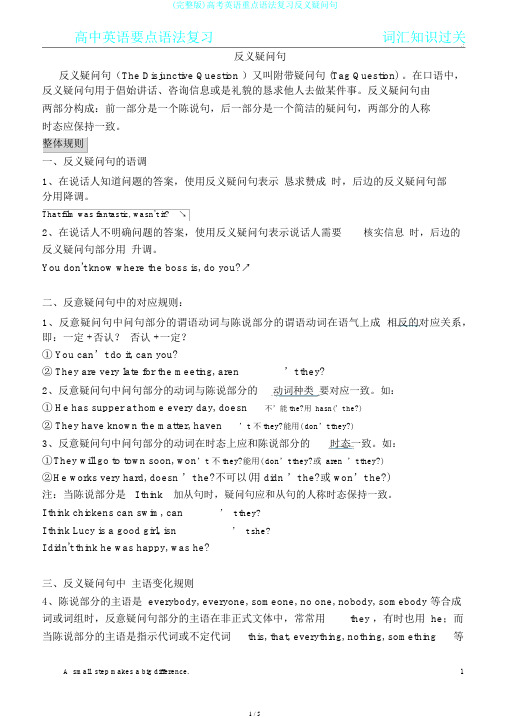
高中英语要点语法复习词汇知识过关反义疑问句反义疑问句(The Disjunctive Question )又叫附带疑问句 (Tag Question) 。
在口语中,反义疑问句用于倡始讲话、咨询信息或是礼貌的恳求他人去做某件事。
反义疑问句由两部分构成:前一部分是一个陈说句,后一部分是一个简洁的疑问句,两部分的人称时态应保持一致。
整体规则一、反义疑问句的语调1、在说话人知道问题的答案,使用反义疑问句表示恳求赞成时,后边的反义疑问句部分用降调。
That film was fantastic, wasn't it?↘2、在说话人不明确问题的答案,使用反义疑问句表示说话人需要核实信息时,后边的反义疑问句部分用升调。
You don't know where the boss is, do you?↗二、反意疑问句中的对应规则:1、反意疑问句中问句部分的谓语动词与陈说部分的谓语动词在语气上成相反的对应关系,即:一定 +否认?否认 +一定?① You can’t do it, can you?② They are very late for the meeting, aren’t they?2、反意疑问句中问句部分的动词与陈说部分的动词种类要对应一致。
如:① He has supper at home every day, doesn不’能the?用hasn(’t he?)② They have known the matter, haven’t不they?能用( don’t they?)3、反意疑问句中问句部分的动词在时态上应和陈说部分的时态一致。
如:①They will go to town soon, won’t不they?能用( don’t they?或aren’t they?)②He works very hard, doesn ’t he?不可以(用 didn ’t he?或 won’t he?)注:当陈说部分是I think加从句时,疑问句应和从句的人称时态保持一致。
十八种特殊的反义疑问句

英语18种特殊的反意疑问句1.祈使句。
祈使句后一般加上will you或won't you构成反意疑问句,用will you 多表示“请求”,用won't you 多表示提醒对方注意。
例如:Look at the blackboard, will you/ won't you?看黑板,好吗?Let引导的祈使句有两种情况:1)Let's...,后的反意疑问句用shall we或shan't we。
例如:Let's go home, shall we/ shan't we? 回家吧,好吗?还可以用may I来表示征求对方的同意或许可。
2)Let us/me...后的反意疑问句用will you或won't you。
例如:Let me have a try, will you/won't you? 让我试一试,行吗?2.感叹句。
感叹句后加反意疑问句时,其反意疑问句需用be的一般现在时态的否定形式。
例如:What fine weather, isn't it? 多好的天气啊,是吧?3. 当陈述部分谓语动词是need, dare, used to,且这些词被用作实义动词时,其反意疑问句需用do的适当形式。
例如:He needs help, doesn't he?他需要帮助,是吗?4.陈述部分主、谓语是I am...时,反意疑问句用aren't I 或am't I ,而不是am notI (可用am I not)。
例如:I'm working now, am't I? 我在工作,是吗?5.陈述部分的主语是everything, nothing, anything或something 时,反意疑问句的主语应用代词it。
例如:Something is wrong with my radio, isn't it? 我的收音机出毛病了,是吧?6.陈述部分的主语是everybody, everyone, anybody, anyone, somebody, someone, nobody, no one, none, neither 时, 其反意疑问句的主语需用复数代词they。
- 1、下载文档前请自行甄别文档内容的完整性,平台不提供额外的编辑、内容补充、找答案等附加服务。
- 2、"仅部分预览"的文档,不可在线预览部分如存在完整性等问题,可反馈申请退款(可完整预览的文档不适用该条件!)。
- 3、如文档侵犯您的权益,请联系客服反馈,我们会尽快为您处理(人工客服工作时间:9:00-18:30)。
反义疑问句反义疑问句 (The Disjunctive Question) 即附加疑问句。
它表示提问人的看法,没有把握,需要对方证实。
反义疑问句由两部分组成:前一部分是一个陈述句,后一部分是一个简短的疑问句,两部分的人称时态应保持一致。
主要形式:陈述部分肯定式+疑问部分否定式;陈述部分否定式+疑问部分肯定式。
1 简述陈述部分和疑问部分要么前肯后否,要么前否后肯。
这类反义疑问句有时带有感情色彩,表示惊奇,愤怒,讽刺,不服气等。
例如:You call this a day's work ,don't you ?你说这就叫一天的活儿,不是吗?2 句式句子结构1.陈述部分肯定句 +疑问部分否定句(可记为前肯后否).例: They work hard, don ’t they?2.陈述部分否定句 +疑问部分肯定句(可记为前否后肯).例: You didn't go, did you?句子类型一种是反义的附加疑问句;一种是非反义的附加疑问句。
简单来说,就是“前肯后否”或“前否后肯”。
3 读法规则反义疑问句陈述部分用降调,问句部分可升可降。
提问者对陈述部分把握较大时,问句部分用降调;反之用升调。
4 速记方法前肯后否,前否后肯,前be 后 be,前情态后情态,前无be 或情态后加助, 并改为否定,时态一致。
5 主语一般词语附加疑问句中主语用和主句一致的主语,用主格。
附加疑问句随从句。
不定代词当陈述部分的主语是( 1) one 时,后面的疑问句可用one/he.( 2) no one 时,后面附加疑问句中主语用they 。
( 3) everything,anything,nothing,something时,附加疑问句中主语用it不用they( 4) this, that,或those, these时,附加疑问句中主语用it或they.( 5) everyone ,everybody , someone,somebody, anyone , nobody 等时,附加疑问句中主语一般用they (口头语,非正式文体)/he (正式文体)。
( 6)不定式时,动名词,其他短语,附加疑问句中主语一般用it 。
( 7) there be句型时,附加疑问句中一般用be/ 情态动词 / 助动词 +there 。
6 否定意义的词(1) 当陈述部分有never , seldom, hardly,few,little,barely, scarcely, nothing,none,rarely,no, not, no one, nobody, neither等否定意义的词汇时,后面的反意疑问句则为肯定形式:There're few apples in the basket, are there?He can hardly swim, can he?They seldom come late, do they?(2) 当陈述部分的主语为 everyone,someone,anyone,no one 等表示人的不定代词时,疑问部分的主语用 they或 he:Everyone in your family is a teacher, aren ’t they \isn't he ?(3) 当陈述部分的主语为everything,something,anything.nothing 等表示物的不定代词时,疑问部分的主语用 it :Something is wrong wi th your watch, isn ’t it?(4) 当陈述部分含有否定意思的词是unhappy,dislike,unfriendly, 等含有否定词缀的派生词,也就是有un,dis,no- 前缀、 -less 后缀等含有词缀而意思否定的词,当做肯定句处理,疑问部分要用否定形式。
如:He looks unhappy,doesn ’t he? 他看上去不高兴,不是吗?The girl dislikes history,doesn ’t she? 这女孩不喜欢历史,不是吗?(5) 当陈述部分有 less, fewer 等词视为肯定词,疑问部分用否定形式。
There will be less pollution, won't there?表示主语的词含有 think, believe, suppose, imagine, expect等动词后接宾语从句构成的主从复合句在构成反意疑问句时,视情况不同有两种不同的构成方式。
(即当主句是I think ,I believe,I suppose,I imagine,I expect时要反问从句,其余句式均反问主句。
)(1) 当主句的主语为第一人称时,其后的简短问句应与从句相一致。
例如:I expect our English teacher will be back this weekend, won't she/he?We suppose you have finished the project, haven't you?值得注意的是,当这些动词后接的宾语从句的否定转移到主句时,其仍属否定句,故其后的简短问句应用肯定式,而非否定式。
例如:I don't believe that he can translate this book, can he?We don't imagine the twins have arrived, have they?此类句子的回答同" 前否后肯 " 型反意疑问句一样,如上述后一个句子,若双胞胎已经到了,则回答为"Yes, they have.";若尚未到达,使用"No, they haven't."。
(2) 当主句的主语为第二、三人称时,其后的简短问句则应与主句相一致(此时,否定只看主句,与从句无关)。
例如:Your sister supposes she needs no help, doesn't she?You thought they could have completed the project, didn't you?They don't believe she's an engineer, do they?She doesn't expect that we are coming so soon, does she?(3) 但如果主句的时态是过去时等等,疑问句应和主句的人称时态保持一致。
better陈述部分有had better,或其中的had 表示完成时态时,疑问句应用hadn’t等开头:You’d better get up early, hadn’t you?其他情况句中有have 时疑问句应用don't等开头如 have 表示“有”的时候,有两种形式:(have 表示有可用do 或 have 来改写)- He has two sisters,doesn’t he? =He has two sisters, hasn’t he?-He doesn't have any sisters,does he?祈使句当陈述部分是祈使句时,疑问句要根据语气来表达,分三种情况:1)一般情况下用will you或won't you。
Give me a hand, will you?Leave all the things as they are, won’t you?2) 以 Let's (听者包括在内)开头的祈使句,前肯后可肯可否,疑问句必须用shall we(shall只用于第一人称) ; 只有以 Let us(听话人不被包括在“ us”里面)或 Let me开头的祈使句,问句才用 will you 。
Let us know the time of your arrival, will you?Let's try again, shall we?Let me help you, will you?Let ’s have a look on your book,shall we ?3) 当陈述句是否定的祈使句时,问句可用will you或can you 。
e.g. don ’t make much noise, will/can you?There be 句型There be 句型中,反义疑问部分必须为be 动词 + thereThere are some apples in the basket, aren't there?There isn't any milk left, is there?there used to be,反义疑问句有两种形式:didn't there和usedn't there.There used to be some cities wall, usedn't there? 或: There used to be some cities wall, didn't there?Must. 当陈述部分有情态动词must,问句有 4 种情况:( 1) mustn't 表示“禁止,不可,不必”时,附加问句通常要用must.You mustn't stop your car here, must you?你不能把车停在这地方,知道吗?( 2) must 表示“有必要”时,附加问句通常要用needn't.They must finish the work today, needn’t they?他们今天要完成这项工作,是吗?( 3) must be 表推测 , 用来表示对现在的情况进行推测时,问句通常要根据 must 后面的动词采用相应的形式。
He must be good at English, isn’t he?他英语一定学得很好,是吗?She must be a good English teacher, isn’t she?她一定是位优秀的英语老师,是吗?(4)当 must have done 表示对过去的情况进行推测(一般句中有明确的过去时间状语),问句要根据陈述部分谓语的情况用“ didn't+ 主语”或“ wasn't/weren't+ 主语”;如果强调动作的完成(一般没有明确的过去时间状语),问句要用“ haven't/has n't+ 主语”。
She must have read the novel last week, didn’t she?她上星期一定读了这本小说,不是吗?You must have told her about it, haven’t you?你一定把这事告诉她了,不是吗?回答反意疑问句的回答:前肯后否,前否后肯,根据事实从后往前翻译。
